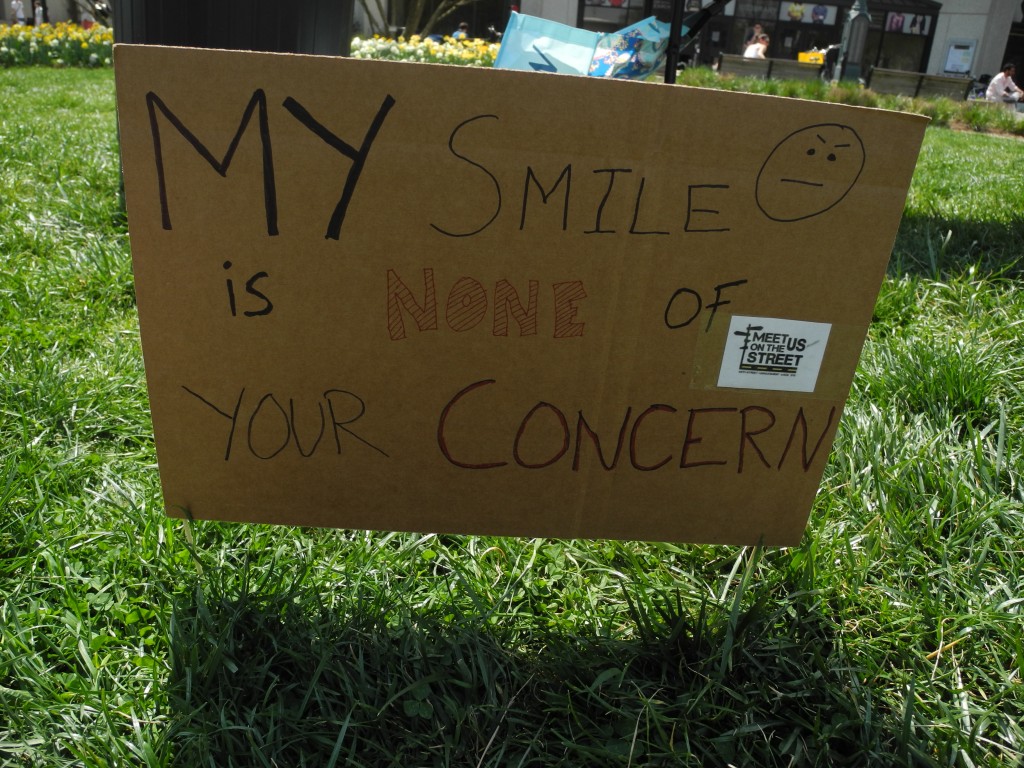Emily Gillingham, Washington, DC, USA, Blog Correspondent
 Are you a street harasser? Are you someone who doesn’t think street harassment is a big deal? Are you interested in the topic of street harassment and want to learn more? Did someone you were arguing with on Twitter give you the link to this blog post? Welcome!
Are you a street harasser? Are you someone who doesn’t think street harassment is a big deal? Are you interested in the topic of street harassment and want to learn more? Did someone you were arguing with on Twitter give you the link to this blog post? Welcome!
I compiled these lists as a helpful reference if you’re wondering where the people arguing with you on the street, in the office, or on Twitter are coming from. I also designed this post as a resource that can be linked to when some stranger on the Internet demands answers to arguments and questions about street harassment, because your time is more valuable than having to run through this all the time.
By no means are these lists exhaustive; for brevity, I designed them to hit the questions and arguments that I see and hear the most.
There are a lot of interesting and comprehensive resources and blog posts about street harassment on this website and elsewhere online. If you have questions beyond this list, I’d suggest browsing through them.
What Types of Things Are Street Harassment?
Stopstreetharassment.org sums it up well: “Gender-based street harassment is unwanted comments, gestures, and actions forced on a stranger in a public place without their consent and is directed at them because of their actual or perceived sex, gender, gender expression, or sexual orientation. Street harassment includes unwanted whistling, leering, sexist, homophobic or transphobic slurs, persistent requests for someone’s name, number or destination after they’ve said no, sexual names, comments and demands, following, flashing, public masturbation, groping, sexual assault, and rape.”
Things That Strangers on the Street Do Not Owe You
* Eye contact
* A smile or other expression of your choosing
* An answer to your question or greeting
* Attention
* A polite response, or any response at all
Things That Don’t Excuse Street Harassment
* Concern that you won’t be able to find a romantic partner if you can’t street harass
* Your perception of or questions about the person’s gender, sex, gender expression, or sexual orientation
* Your desire to give a compliment
* What the person is wearing
* What time it is
* What part of town the person is walking in
* Whether you think the person is attractive or not
* Your perception of or questions about the person’s race, class, religion, disability, or nationality
* Whether or not the person is wearing a wedding ring
* Your opinion about the person you wish to harass
* What the person is doing
* Whether you think street harassment is a “big deal” or something that should make people uncomfortable or not
* Whether or not you are a “nice guy”
Why You Should Not Street Harass
* Street harassment makes lot of people uncomfortable and you don’t know who those people are.
* Many people who rebuff or ignore street harassers have been subjected to violence, even in the U.S.; the people you harass don’t know if you are someone who would do them harm or not.
* What you might think is friendly or a compliment may not be perceived that way by others.
* Street harassment forces many people to rearrange their daily routines around when and where they can feel safe.
* You should care about respecting the dignity of others.
Emily is a 3L at Michigan State University College of Law, and the president of her school’s chapter of LSRJ. Follow her on Twitter @emgillingham.
